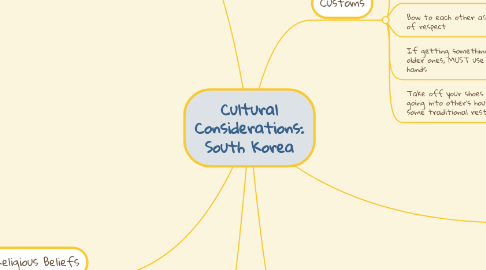
1. Holidays and Celebrations
1.1. Lunar New Year’s Day (Seol or Seollal)
1.1.1. Food called tteokguk, or “rice flake soup”
1.1.2. Performance called Sebae (New Year’s Bow)
1.1.3. Elders present New Year’s gift money to their juniors
1.2. Daeboreum (Greater Full Moon)
1.2.1. Celebrate on the fifteenth day of the first lunar month
1.2.2. Play games for community unity and perform rituals for good harvest
1.3. Chuseok
1.3.1. Celebrate on the fifteenth day of eighth lunar month
1.3.1.1. Festival food called ogokbap
1.3.2. Thanksgiving service
1.3.3. As important as Lunar New Year
1.3.3.1. One out of two annual occasions when familiy members are gathered together
1.4. 100th day anniversary and first birthday of their babies
1.4.1. large celebratory banquet for their baby with a ritual prayer
1.4.1.1. Health
1.4.1.2. Success
1.4.1.3. Longetivity
1.4.2. Participants give gold rings
1.5. Weddings
1.5.1. Traditional rituals
1.5.1.1. Pyebaek (traditional ceremony to pay respect to the groom's family after their wedding)
1.5.1.2. Ibaji (wedding food that the bride presents to the groom's family)
2. Religious Beliefs
2.1. Buddhism (30 percent), Christianity (25 percent), Confucianism (0.2%)
2.1.1. Buddhism
2.1.1.1. Respect the environment
2.1.1.2. avoid harming others
2.1.2. Christianity
2.1.2.1. Shouldn't bully the poor as the purchaser will have to pay up the full price that the goods are worth to him
2.1.3. Confucianism
2.1.3.1. welfare of family is more important than that of the individual
2.1.3.2. concerned with the fulfilment of responsibilities
3. Business Etiquette
3.1. Punctuality is important
3.2. Gift giving is a common practice to buiild relationships
3.3. When addressing someone, use his/her title along with his/her family name
3.4. modesty and humility is important, therefore don't over-sell yourself during interviews (seem rude)
3.5. decision-making takes some time, patience is important
3.6. avoid criticising/opposing someone in public
4. Customs
4.1. The most expensive/highest value gift should be given to the person of highest rank with colleague of equal rank receiving a gift of similar value.
4.2. Older Koreans might grill you with questions, if you are uncomfortable with it, change subject as soon as possible.
4.3. Bow to each other as a sense of respect
4.4. If getting something from older ones, MUST use both hands
4.5. Take off your shoes before going into other's house and some traditional restaurant
5. Communication Protocols
5.1. Business cards
5.1.1. - Have a good supply of business cards and exchange it using both hands.
5.1.2. - Should be translated on one side into Korean.
5.1.3. - Treat it with respect to avoid insulting them. Examine first before putting it away.
5.1.4. - if can't bow, use right hand and support right elbow with your left hand
5.2. Handshakes
5.2.1. - Wait for the elders or senior to offer their hand first
5.2.2. - Support your right hand with your left hand and maintain eye contact
5.2.3. - More women, wait for them to initiate as some women prefer to bow instead.
5.2.4. - Never use your index finger to point at someone
